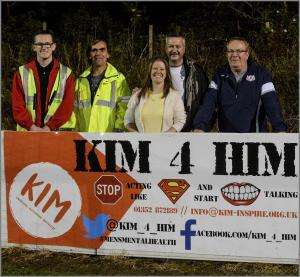Getting men talking about feelings key to tackling high suicide rate

Professional Social Work magazine - 10 September 2019
Finding "spaces" for men to talk about their feelings is vital a social worker warned as new figures show middle-aged males are significantly more likely to commit suicide.
The rate per 100,000 for men aged 45-49 was 27.1 last year, compared to the UK average of 11.2 deaths per 100,000 according to the Office for National Statistics. For women of that age range the rate was 9.2 deaths.
Men of all ages were more than three times more likely to commit suicide than women with an average rate of 17.2 deaths compared to 5.4 per 100,000 for women.
There was a 14 per cent rise in all male suicides and a ten per cent rise in all female suicides. However, the trend for both has been downward since 1981. The biggest increase in male suicides was among those aged 75 and over (up 32 per cent) and those aged 20-24 (up 31 per cent).
Social worker Andy Matthews, who runs a project supporting men with mental health issues through activities in Wales called Kim 4 Him, said: “There is research saying men seeing services as being 'feminised' is one of the reason they don’t engage. There is also the social stigma and the perceived gender role of men. Men will often chose other coping mechanisms instead of coming forward - the main ones are drink, drugs and suicide.”
Matthews, who is carrying out a five-year PhD study looking at the gap in provision for men, added: “What I think will come from it is how we try and find those spaces where it is okay for men to have those conversations and seek the support they may need. It is that mindset which needs to change.”
Kim 4 Him has proved successful in getting men to talk about their mental wellbeing through initiatives such as a breakfast club, a "football shed" and "mancraft" which includes electronics, gadgets and photography activities.
Claire Barcham, chair of BASW's mental health practice, policy and education group, said the current climate of uncertainty could be impacting on people's mental health and contributing to the rise in suicide seen in the ONS figures.
"The findings highlight concerns expressed by social workers in many sectors. There so many pressures on people today. Young people face concerns about their futures with changing opportunities and work patterns.
"Men face uncertainty around changing role expectations and this may particularly affect middle-aged men who can feel dislocated from the world they are living in. Social isolation plays a part too with more people living on their own."
Barcham added: "The current political turmoil around Brexit can only add to the confusion and uncertainty some people feel today.”
A minister for suicide prevention was appointed last year in England after previous Prime Minister Theresa May identified poor mental health as a “burning injustice”.
Overall, there were 6,507 suicides in the UK in 2018. Scotland had the highest rate at 16.1 per 100,000. Figures for Northern Ireland are yet to be published.
The highest regional suicide rate for men was in the North East with a rate of 20.4 per 100,000. For women it was Wales with a rate of 6.9.
Men in Wales were the second most likely to commit suicide (19.1 per 100,000), followed by men in Yorkshire and The Humber (19), the South West (17.7), the East (17.6), the North West 917), West Midlands (15.7), East Midlands (14.8), London 13.8). The South East had the lowest rate at 13.5. The biggest rate rise last year was among men Yorkshire and Humber (up 24 per cent).
Yorkshire and The Humber also had the second highest suicide rate for women (5.7) matched by the South West, followed by the East (5.4), the North East (5.2), the West Midlands (4.9), the North West (4.8), the East Midlands and the South East (4.7 each) and London (4.1).
A worrying 83 per cent increase in suicides among females aged ten to 24 and a 25 per cent rise in males of that age was reported, however figures were relatively low (3.3 and 9 per 100,000 respectively).
Nick Stripe, head of health and analysis and life events for the ONS, said: “We saw a significant increase in the rate of deaths registered as suicide last year which has changed a trend of continuous decline since 2013.
"While the exact reasons for this are unknown, the latest data show that this was largely driven by an increase among men who have continued to be most at risk of dying by suicide. In recent years, there have also been increases in the rate among young adults, with females under 25 reaching the highest rate on record for their age group.
“Looking at the overall trend since the early 80s, we are still witnessing a gradual decline in the rate of suicide for the population as a whole.”
This article is published by Professional Social work magazine which provides a platform for a range of perspectives across the social work sector. It does not necessarily reflect the views of the British Association of Social Workers.
